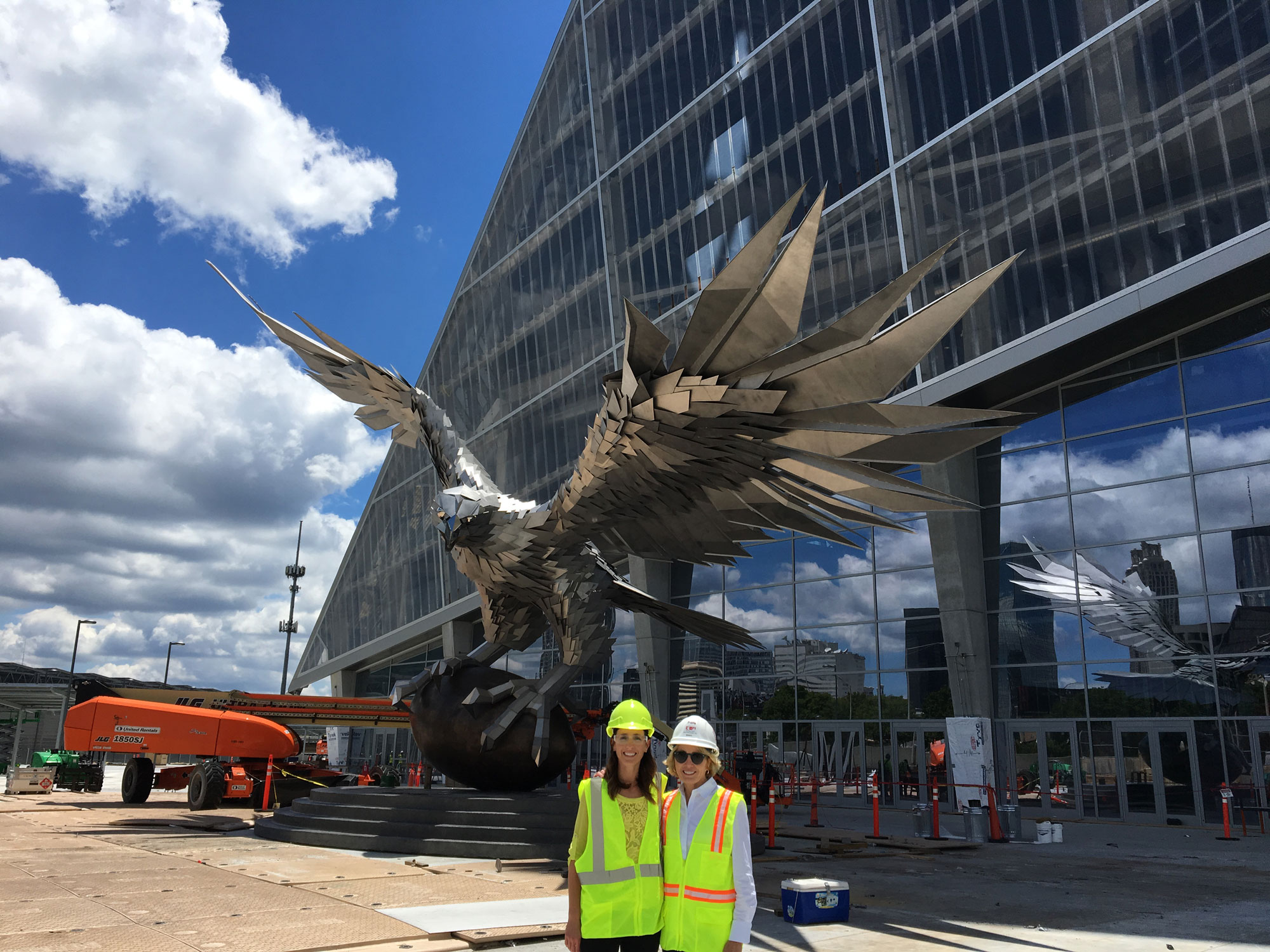- Spring 2019
Where Are They Now?
Our alumni have a lifelong connection to NCAT. Whether it’s the relationships they built, practical skills they developed or the world class education they received, each graduate takes something special from their experience at Auburn. In this issue, we reconnect with Angela (Priest) Fannéy, John Haddock and Mike Law to learn more about their days at NCAT and the routes they’ve taken since graduation.
Angela (Priest) Fannéy

Angela Fannéy (left) with her mentor Emmy Montanye (right) at the Mercedez-Benz Stadium in Atlanta, Georgia.
Angela Fannéy wanted to be a civil engineer since her sophomore year in high school. Now a vice president at Kimley-Horn and Associates in Atlanta, Georgia, she reflects back to her time at NCAT as being a fundamental part of her successful career.
“I was in Dave Timm’s undergraduate pavement class and I got a job working at the Test Track in the summer of 2003,” said Fannéy. “It was hard work, but it was a lot of fun.”
Fannéy stayed at Auburn to pursue a master’s degree, which allowed her to finish the complete cycle of testing at the track. “I was able to see how we develop the test sections, build instrumentation physically with my hands, conduct mechanistic-empirical research and then present the findings to the NCAT steering committee,” said Fannéy. “I also helped as we were trying to raise funds to develop the next research cycle. Those presentation and selling skills were more beneficial than I realized at the time.”
In her current role, Fannéy leads site civil consulting services for high density urban commercial redevelopment including retail and office spaces, apartments and sports facilities. She enjoys the challenge of collaborating in a multidisciplinary team environment and getting out of her comfort zone. “I work for a firm that prides ourselves in saying yes to what others say no to,” she said. “Whether it’s finishing a project in a tight time frame or just having the opportunity to work in a team with architects, landscape architects and engineers to solve complex problems.”
Her most high-profile project, the Mercedes-Benz Stadium, was on the world stage earlier this year as home to Super Bowl LIII. Fannéy served as project manager of the civil engineering design for the LEED platinum building, including an innovative storm water runoff system to capture rainwater for reuse in landscape irrigation and the mechanical system’s heating and cooling towers.
Fannéy’s hopes for future civil engineers is that they recognize the sweat and sacrifice that success demands. “There is no secret to success other than hard work, curiosity and communication,” she said. “I saw that in action at NCAT from the truck drivers, everyone working in the lab and the engineers. My experience at the Test Track provided the perfect foundation for a rewarding career.”
John Haddock

John Haddock (seated) with his family in December 2018.
Building relationships requires authenticity, openness and commitment. For John Haddock, civil engineering professor at Purdue University and director of the Indiana Local Technical Assistance Program, many of the connections he’s made through NCAT have endured throughout his career path.
Haddock earned his bachelor’s and master’s degrees in civil engineering from Purdue and was working for Heritage Research Group when he caught the attention of then NCAT director Ray Brown at a Transportation Research Board Annual Meeting. “Ray needed a research engineer who was familiar with stone matrix asphalt, and I was working on some of its early incarnations in the Midwest,” Haddock explained.
Married and with three children, the family moved to Auburn, Alabama in 1993 where he worked full time at NCAT as a research engineer while pursuing his doctorate. “I have very fond memories of the time I spent at Alabama and NCAT,” said Haddock. “It jumpstarted my career. When people in our industry find out that you worked at NCAT, it’s kind of a big deal. And the fact that I finished my Ph.D. under Ray’s tutelage didn’t hurt, either.”
After earning his PhD and welcoming the birth of a fourth child, Haddock returned to the north. He’s since worked for the Indiana Department of Transportation, the Asphalt Institute and Purdue University, where he has taught for the past 19 years.
Haddock’s work has taken him to six of the seven continents of the world, and his path often crosses with NCAT Director Randy West, recently retired training manager Don Watson, and fellow alumni Rajib Mallick and Shane Buchanan.
His research is focused on increasing the sustainability of our nation’s infrastructure and better relating laboratory test results to the field performance of asphalt pavements, which has led to numerous standard test methods and materials specifications.
When Haddock isn’t working, he enjoys spending time with his family. “We have two grandkids and one on the way,” he said. “It’s the best part of life.”
Mike Law

Mike Law on the job with Scotty's Contracting & Stone.
As vice president of materials at Bowling Green-based Scotty’s Contracting & Stone, Mike Law is continually working to get better, longer lasting pavements in Kentucky. A leading asphalt and crushed stone producer in the state, Scotty’s produces over 1.5 million tons of asphalt and crushes over one million tons of limestone aggregate each year.
“Scotty (James Scott) was looking for an engineer to head up his quality control division,” said Law. “He got in touch with Don Brock at Astec Industries, who then referred him to Ray Brown. He knew that the best place to find a young engineer was at Auburn. I’m greatly appreciative of my association with NCAT, especially since it’s opened so many doors and given me credibility throughout my career.”
Law began working part-time in the NCAT lab during his junior year as an undergraduate in 1995 and continued with a research assistantship while pursuing his master’s degree, which he received in 2000.
“NCAT gave me the technical and engineering basis I would need to work with asphalt paving contractors,” said Law. “I was able to get an incredible hands-on experience and background of the materials side of the asphalt business.”
Law lives in Kentucky with his wife, who he met while studying at Auburn, and their four children. He currently serves on boards of the Plant Mix Asphalt Industry of Kentucky and the Kentucky Crushed Stone Association and chairs the technical committees for both associations. He also serves as vice chair of the NCAT applications steering committee.
“Throughout my career, I’ve really been able to appreciate the incredible reputation that NCAT has in the asphalt paving industry,” said Law. “It’s the leading institution for asphalt pavement research and NCAT is constantly improving the quality of the roads in this country through its research, outreach and education.”